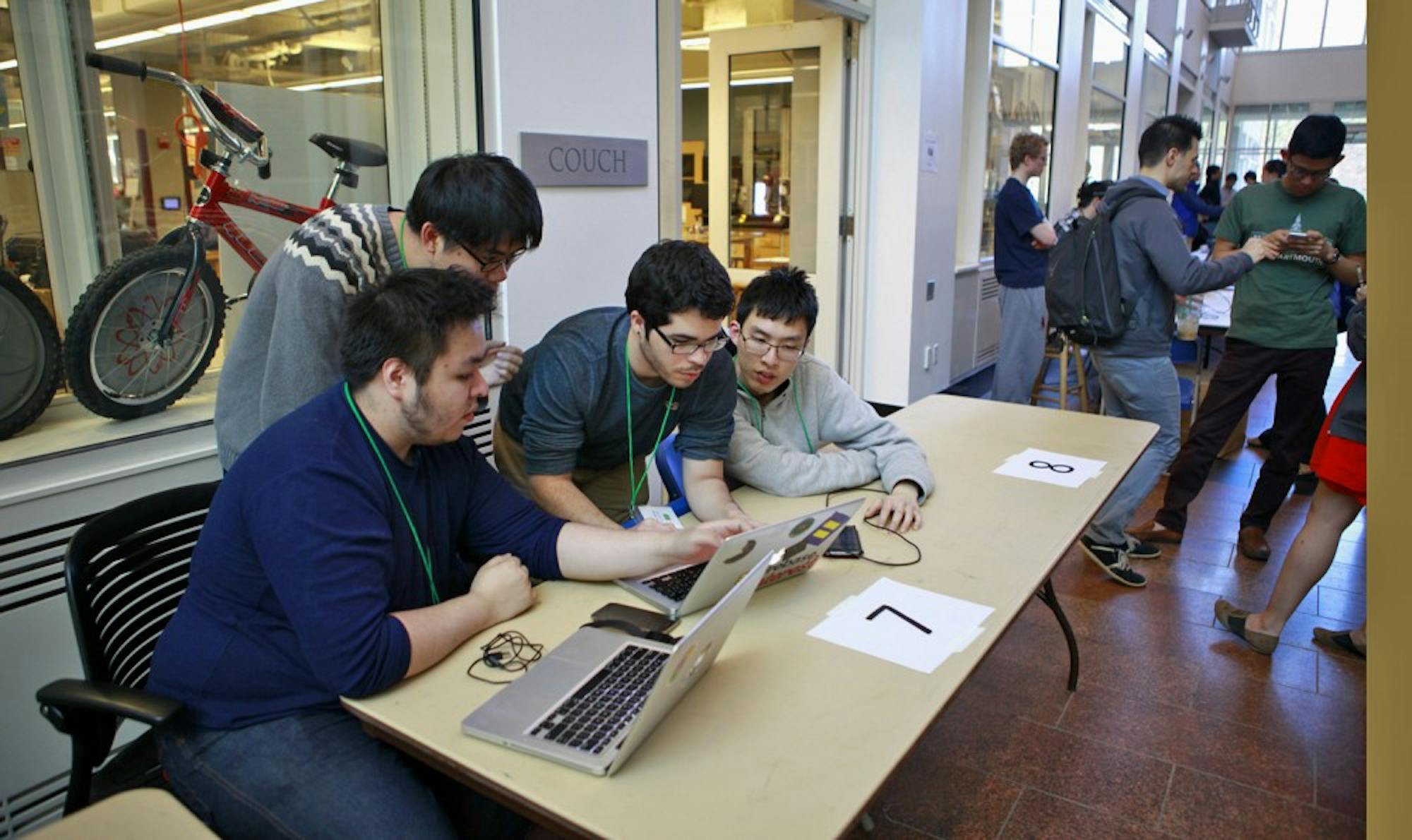Computer science department chair Tom Cormen said that in this age of technology, his mantra is “if you can’t compute, you can’t compete.” This weekend, about 200 students — including students from the College and several other schools — put this idea into practice at HackDartmouth — the College’s inaugural student-run hackathon — where they divided into teams to develop a web or mobile application.
Student organizer Colby Ye ’16 said that HackDartmouth received a total of 575 applications, and that all applicants from the College were accepted.
Over the course of about 24 hours, the teams created programs ranging from a self-help tip finder to a Facebook newsfeed visualizer. A panel of judges selected the winning hacks based on creativity, usefulness, technical complexity and form, awarding top finishers a total of $8,250 of prizes.
Henry Wilson ’18 and his two teammates, Robert Sayegh ’18 and Kooshul Jhaveri ’18 designed Swipr, a program that allows students to access meal plan information via Pebble smartwatch, in the hackathon. Although Wilson said his team had no idea what to do going into the hackathon, they ultimately won the competition.
“It was a really fun environment,” Wilson said. “It was something I had never really done before, making something really quickly, surrounded by a lot of other people who have the same interests.”
Student organizer Colby Ye ’16 said his planning team had three main goals — to give students an opportunity to apply the skills they learn in the classroom, to increase exposure to careers in technology and to foster a kind of “hacking culture.”
“I don’t think Dartmouth has been historically known for having a very strong hacker culture,” Ye said, describing such a culture as one that embraces creativity and elegant solutions, in combination with technology.
Student organizer Martin Moon ’16 echoed Ye’s sentiments, adding that HackDartmouth provides an avenue for creativity and could help change the tech culture at the College, which he said currently lags behind that of some other schools.
“We had a pretty strong showing from some universities, but again, nothing compared to other hackathons,” Moon said.
All other Ivy League schools have already hosted hackathons. Looking forward, the organizers said they hope that HackDartmouth will become an annual event.
The event’s programming included opportunities to speak with representatives from companies like Microsoft, Adobe, Palantir and Pebble. Several sponsors also offered prizes to teams that did the best in specific categories, such as “Best Hack for Social Good” or “Best Google Hack.”
Wilson said the networking options seemed more focused on supporting education than recruiting.
Cormen, who helped judge the various projects, said that understanding computation is important because of its pervasive and often complex use. He said that according to a Boeing computer services employee, for example, a modern jetliner runs programs written in 72 different computing languages.
“Dartmouth students are going to become leaders,” Cormen said. “And they’re going to be helping to frame decisions that affect a lot of people, and a lot of these decisions are going to have some technology component. And it’s important to understand something about the technology.”
Ye emphasized that HackDartmouth was a Dartmouth community effort, and not just a “tech people” initiative. The Dartmouth Entrepreneurial Network, the Thayer School, the computer science department, the DALI Lab and the Neukom Institute partnered with the HackDartmouth team to run the event.
“My vision for it is to make it a better event — to strengthen the mentoring,” Ye said, speaking of the future. “I think that’s what Dartmouth does best. We are a small school that really prizes the strength of the relationships between students and between students and faculty.”
The number of computer science majors at Dartmouth has been following an upward trend over the past few years, Cormen said, representing a growing interest in the field. Some courses, such as “Introduction to Programming and Competition,” have recently been capped for the first time due to large enrollment.
Moon said he was initially unsure about HackDartmouth because he did not know what to expect. Both Moon and Ye, however, said they were happy with how the event went based on student feedback and that they did not encounter many problems.
“It was worth all the late nights of crunch time,” Moon said.
Ye is a former member of The Dartmouth staff.




